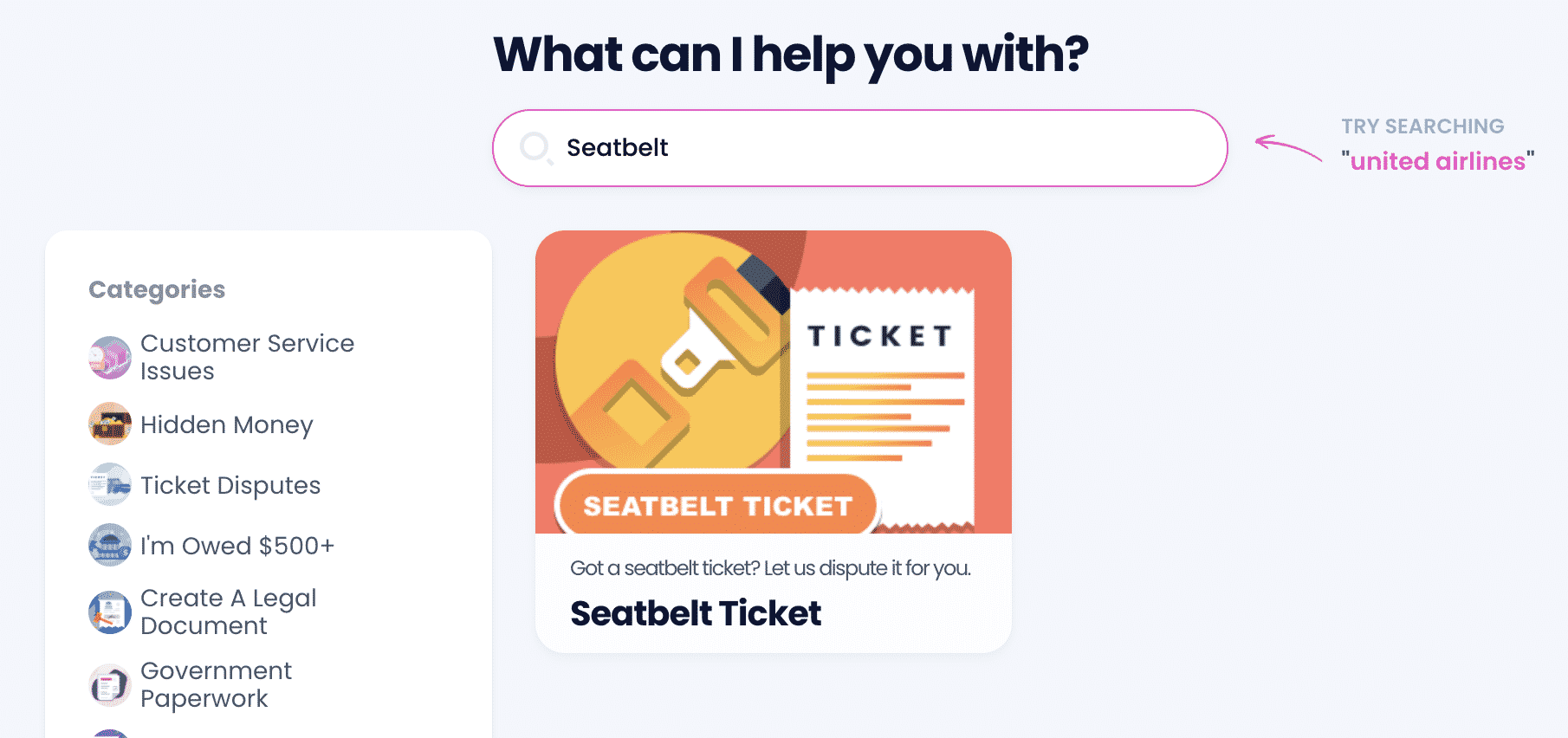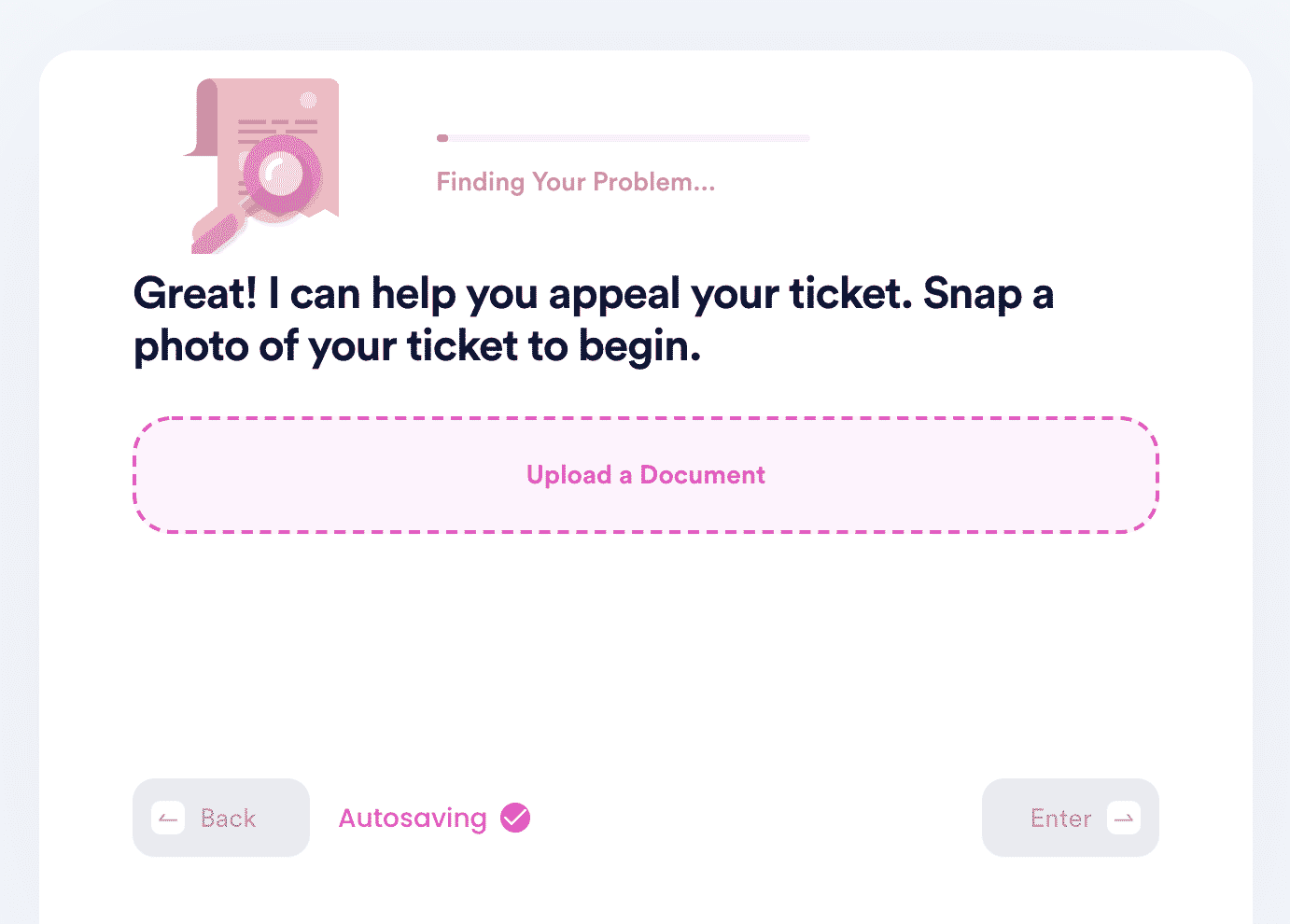Learn About the Commercial Vehicle Seatbelt Law and Avoid Getting a Ticket
To avoid car accident fatalities and injuries, seatbelt laws are installed in every state in the U.S. While the regulations for motor vehicles are better known, there is often an enigma around commercial vehicle seatbelt laws. For that reason, failing to wear a seatbelt while operating a commercial motor vehicle ranked as the third most common roadside driver violation in 2020.
Does the driver need to wear the seatbelt at all times? Who is responsible if a passenger isn’t buckled up? DoNotPay has the answers to these questions!
Learn all about the seatbelt regulations for commercial motor vehicles in our comprehensive guide. If you got a ticket you didn't deserve, we can help you fight it stress-free!
What Are the Commercial Motor Vehicle Seatbelt Laws?
The Federal Motor Carrier Safety Administration (FMCSA) regulates that a driver operating a commercial motor vehicle must use a seatbelt whenever the vehicle is in motion. This law is applicable in all states.
The driver is responsible that all passengers wear safety belts during the ride. If the seatbelt assemblies are installed at the passenger seats, the vehicle operator shouldn’t drive until all occupants are restrained properly. The FMCSA issued stricter rules back in 2016, which hold the commercial drivers accountable for ensuring that their vehicle passengers have the seatbelts on.
Operators of the vehicles aren’t required to provide a child restraint system as that is up to parents or guardians.
There are exceptions when the passenger or driver isn't required to wear a seatbelt—such as:
- A commercial vehicle driver needs to make deliveries or frequent stops—and the speed between them isn’t exceeding 25 mph
- The vehicle was manufactured before 1972
- A driver or passenger can’t wear a safety belt for medical reasons
How Much Is the Ticket for Disrespecting the Commercial Vehicle Seatbelt Law?
Any driver who violates the seatbelt law or fails to make sure that the passengers are restrained can be issued a penalty. The amount of the fine depends on the state, but in general, the penalty is:
- At least $100 but not more than $500 for the first violation
- At least $200 but not more than $500 for subsequent violations
In Minnesota, for example, the ticket will cost you $103, while in Georgia, you’ll need to pay $220 for the first seatbelt offense.
Does the Seatbelt Ticket Go on Your Driving Record?
The aftermath of the seatbelt ticket depends on the state. Some consider it a primary offense, while in others, it is a secondary traffic violation. Here are the details:
- Primary offense—If the CMV enforcement officers have the authority to cite the drivers for not wearing a seatbelt—without committing any other traffic violation—then the state considers seatbelt laws as primary enforcement. In this case, you’ll probably get demerit points that go towards license suspension
- Secondary offense—When you can’t be pulled over because of the seatbelt violation, that state considers it a secondary offense. You might get away with an untainted driving record in this situation
Note that getting a seatbelt ticket for your car won’t affect your commercial driver's license (CDL).
To get to know the laws in the place you are driving to, review our helpful state-specific guides:
Will a Seatbelt Ticket Affect the Insurance Rates for Commercial Vehicles?
When a company is insuring commercial vehicles, it is asked to provide information about the drivers. The insurer will assess the risk that the company presents and offer the rate based on that. If they notice seatbelt violations in the driver’s record, the insurance rate will most likely increase.
In some states, all moving violations affect your insurance rate to a certain extent. When you get a seatbelt ticket on top of your previous traffic offenses, the rate goes up significantly.
What Happens if You Don’t Pay the Ticket?
Not paying the ticket or not showing up in court can result in additional penalties, higher fines, and a warrant for your arrest—potentially. If you are guilty of the violation, you should pay the price. If not, the fees will accumulate on top of the initial seatbelt ticket.
In case you have a credible argument for dismissing a ticket, you should fight it. You might have a doctor’s certificate that you shouldn’t wear a seatbelt, or you were about to drive in reverse when the officer fined you. These are some examples of what can pass in court as a justified cause for not wearing a seatbelt.
If you have a good argument but aren’t the best at putting it into words, . It is a cheaper, faster, and better solution than hiring costly lawyers.

Keep Your CDL Spotless With the Help of DoNotPay!
You don’t need to fight the ticket alone when you can , and let us draft a powerful appeal letter. The only obligation you have is to:
- Open the app and click on the Seatbelt Tickets product
- Add the photo of your ticket
- Tell us:
- Who got the ticket
- When it was issues
- What happened exactly
- What argument you want to use
It will take our AI-powered app a couple of minutes to wrap it up. Your tailor-made letter will be sent to the authorities, and that’s it!

Anything Else You Need?
DoNotPay offers an exhaustive range of products and services for one low monthly fee. You can take full advantage of our offer once you resolve the issue at hand.
Our app can both save you money and help you earn it—sign up to appeal parking tickets, get assistance with utility bills, get compensation from airlines, request a refund, have your college application fees waived, find your missing money, reduce property taxes, enter any sweepstake, or send a financial aid appeal letter to any school.
We can also turn your gift card balance into cash, help you apply for scholarships, and assist you in getting compensation as a victim of crime.
There’s Even More to Our Offer
The world’s first AI Consumer Champion can turn any nightmarish admin or procedure into a piece of cake. Look into our knowledge base to find out how to send a letter of warning to your bad neighbor, submit an anonymous complaint to your HR, fight workplace discrimination, get access to public records, deal with a stalker or harasser, put an end to robocalls, and file a complaint with any company.
 By
By